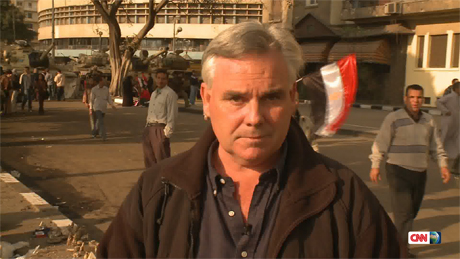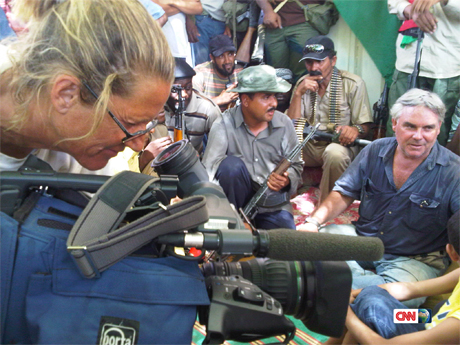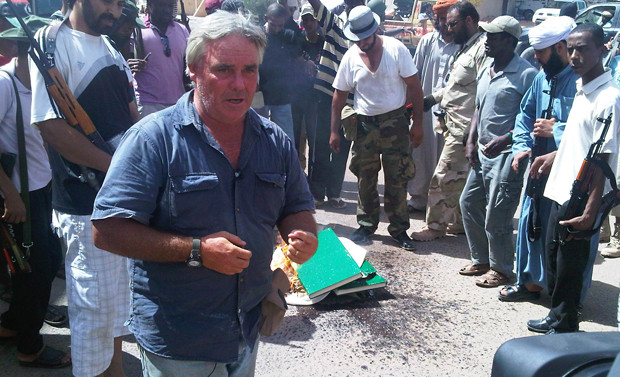CNN's senior international correspondent Ben Wedeman has a knack of being in the right place at the right time. According to Wedeman, his was the first crew of Western journalists to enter Libya after the revolt began on 17 February; his was the first crew to enter Benghazi when he was travelling with anti-Gaddafi fighters; and he was on a plane to Tunisia when news came through that the country's former president, Zine el Abedine ben Ali, had resigned. But on Thursday (20 October) he was in the US when he heard that Libya's former leader Muammar Gaddafi had been killed.
Wedeman spoke to Journalism.co.uk about the disappointment of being in New York and not Sirte when Gaddafi fell, and of his experience reporting on the Arab uprisings in Tunisia, Libya and from his adopted home of Egypt.
Upon hearing of unrest and a possible uprising in Libya, Wedeman left Cairo, the city which has been his home for the past 10 years, and apparently became one of the first Western journalists to enter the country. He described how his crew was received.It's important not to take a snapshot but to take a long video of what's going onCNN's Ben Wedeman
"Every step along the way, though the various towns and cities we passed through, was a mind-bending scene because as the first journalists to arrive we were treated as if we were actually liberating the country. In some areas, even in the middle of the night, our car was just mobbed by hundreds of people throwing dates and cheering us and thanking us."
Regretting being in New York and not Libya on the day Gaddafi was killed Wedeman said: "As someone who has covered the story for so long I wish I'd been there for that critical moment. However, you can't be in more than one place at a time and New York is a very long way from Sirte and it's just the way it goes."
Wedeman, an Arabic speaker, has covered the Arab Spring from the first of the uprisings, which took place in Tunisia. He and his crew headed for the country pretending to be tourists.
"We had to ditch all of our heavy television equipment and bring in things that would make it appear as if we were tourists. We came up with this cover story that we were teachers who picked the wrong place to go at the wrong time. Oddly enough while our plane, which was flying from Beirut to Tunis, was in the air the president of Tunisia resigned so we arrived on the ground and everything had changed."
Suddenly Wedeman and his crew did not need a cover story and found themselves reporting with a small video camera, without their usual kit of cameras, lights and battery chargers.
"Tunisia was interesting because that was when people started to talk of the possibility of more revolutions to come. I was somewhat sceptical as I've lived in Egypt more than 10 years and I knew that even though there was much discontent, much poverty, much resentment at the regime of Hosni Mubarak, Tunisia was sort of the mouse of the Arab world, and of course on this occasion it was the mouse that roared and it was the beginning of a long string of revolutions that of course haven't ended yet."

Ben Wedeman reports on the uprising in Egypt which toppled Hosni Mubarak.
Image: CNN
From Tunisia Wedeman went home to Egypt, arriving the night before the revolution there began.
"The Egyptian revolution was a little too close to home since I have a family there, I have a house. It's one thing to fly into Libya or Tunisia or where things are happening and you're busy with the story but in Egypt I had to worry about the safety and security of my family and house because the situation was very unstable, so that pulled me in many different directions. The revolution isn't really over in Egypt, it's still ongoing, and is a more difficult place than any other for me to cover because of my multiple responsibilities."
From Egypt Wedeman then went to Libya. "The revolution in Libya was, in comparison to Egypt, much easier to cover. Physically it was very exhausting and demanding and often dangerous, however, I only had to focus on the news."I always tried to seek out people who weren't cheering, who weren't celebrating the arrival of the new regimeCNN's Ben Wedeman
As an Arabic speaker Wedeman said his language skills make a "huge difference".
"For one thing I don't have to work through a translator. I can read the graffiti on the wall, I can read the newspaper, I can overhear conversations. As a translator I trust myself more than any other translator, so it opens up everything.
"Of course I've worked through translators in places like Afghanistan and you are seeing through a misty window when looking at what is going on in front of you."
Asked if journalists covering the uprising in Libya have got the full story, Wedeman explained that the reports that reached international news outlets were not necessarily balanced.
"It was difficult to really cover both sides. On the one hand you had the rebels' side, which was easy as you didn't need a visa, but covering the other side, covering the Gaddafi regime, it was much more difficult and getting a visa was hard and once you were in the hotel you could only go to events or speak to people approved by the government. I never covered that side of the story and part of me wishes I had."
CNN, on behalf of Wedeman, had tried to get a visa so that he could speak to the Gaddafi side but as his coverage with the rebels had been screened he had become known to the government and his visa request was turned down.
"When we would go to towns that were 'liberated by the rebels' I always tried to seek out people who weren't cheering, who weren't celebrating the arrival of the new regime, just to get their opinion and I was always impressed by the civility of these people in speaking with us because the media under Muammar Gaddafi, certainly during the uprising, would often describe foreign journalists as spies, as collaborating with Al Qaida, but these people who were sympathetic to Gaddafi were polite and willing and able to explain the reasoning for their support for him. Whatever story you cover it's important to try to listen to the other side, you don't have to agree with it."
He paid tribute to those journalists who did report from the pro-Gaddafi side.
"Some journalists, especially those who could speak Arabic, were quite successful at finding the other side of the story, but unfortunately on any big story, whether it is the Egyptian revolution or Libya, you tend to have lots of people come to the region for the first time and report first impressions rather than going into depth on anything."
 Ben Wedeman and Mary Rogers during an interview of the residents of
Ben Wedeman and Mary Rogers during an interview of the residents ofal-Gurda neighbourhood in Sabha on 21 September. Image: CNN
Wedeman appealed to journalists and news organisations to keep a close eye and revisit the countries where uprisings have taken place.
"We often get all excited and interested in a story at certain times: Gaddafi gets killed, everybody goes crazy; Tripoli falls and it's a big story; Mubarak resigns and everyone has their attention on Cairo, but the fact of the matter is that these stories go on and on and on.
"In Egypt, we had a wonderful, beautiful 18-day revolution, which ended with the fall of Hosni Mubarak on 11 February, but since then things have become very complicated. The euphoria that you see on the days when the media focuses on a story passes very quickly and the reality starts to set in.
"So I think it's important that journalists who are serious about covering what is being called the Great Arab Revolt, the Arab Spring, they need to follow up, they can't just cover the big moments because this is a story of huge historical importance that will reverberate for years afterwards, a bit like World War I and its impact on the Middle East that we feel to this very day. It's important not to take a snapshot but to take a long video of what's going on."
Free daily newsletter
If you like our news and feature articles, you can sign up to receive our free daily (Mon-Fri) email newsletter (mobile friendly).
Related articles
- Delivering news during the war: reflections on EBU's visit to Ukraine
- Ukrainian journalists are at a breaking point. It is time to make a change
- Six career lessons in war and conflict reporting
- Unveiling the lessons of a war reporter's journey, with Andrea Backhaus
- Why journalists risk their lives for a story, with Dr Anthony Feinstein










